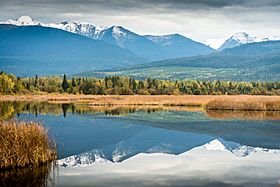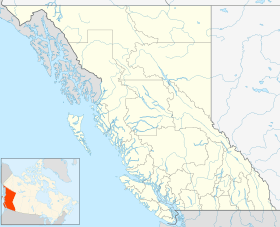Cranberry Marsh/Starratt Wildlife Management Area facts for kids
Quick facts for kids Cranberry Marsh/Starratt Wildlife Management Area |
|
|---|---|
|
IUCN Category IV (Habitat/Species Management Area)
|
|
 |
|
| Location | Valemount, British Columbia |
| Area | 319 ha (790 acres) |
| Designation | Wildlife Management Area |
| Established | 28 March 2013 |
| Governing body | FLNRORD |
Cranberry Marsh/Starratt Wildlife Management Area is a special place near Valemount, British Columbia. It's a "wildlife management area," which means it's protected land for animals and plants. This area was created on March 28, 2013, by the British Columbia government. Its main goal is to protect Cranberry Marsh, a very important freshwater marsh. This marsh is a key spot for many migratory birds to stop and rest during their long journeys. It's also a safe place for them to raise their young.
Contents
What is Cranberry Marsh?
Cranberry Marsh used to be a lake with a flat bottom. Now, it's a marsh that drains into the valley. Even though it looks natural, people have worked hard to make it an even better home for birds and other wildlife. This helps both the birds that live there all the time and those that just visit.
Exploring the Marsh
The area has a fun 5.5-kilometer loop trail. This trail goes all the way around the marsh. There is also a small wooden tower. This tower is perfect for birdwatching, letting you see many different bird species up close.
Wildlife and Nature at the Marsh
The marsh is a mix of different plants and open water. You can see patches of sedges and tall cattails. Along the edges of the marsh, there are groups of aspen and willow trees.
Animals You Might See
Many animals call Cranberry Marsh home. You might spot beavers building their dams. Muskrats, which look a bit like small beavers, also live here. And sometimes, you might even see a large moose walking through the marsh.
Birds and Their Journeys
Cranberry Marsh is in a very important location for birds. It sits where two major bird migration paths meet. These paths are called the Columbian and Thompson-Okanagan corridors. Because of this, many different types of migratory birds use the marsh. It's a crucial stopover point where they can rest and find food. It's also a place where many birds choose to nest and have their babies.
The marsh is also a critical home for a special bird called the American Bittern. This bird is "blue-listed," which means it's a species of concern in British Columbia. Protecting places like Cranberry Marsh helps these important birds survive.
 | John T. Biggers |
 | Thomas Blackshear |
 | Mark Bradford |
 | Beverly Buchanan |


